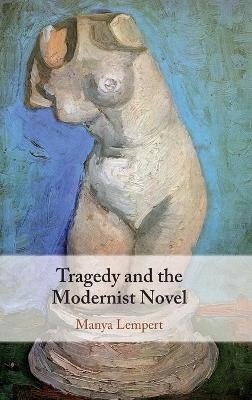
Tragedy and the Modernist Novel
Cambridge University Press (Verlag)
978-1-108-49602-5 (ISBN)
This study of tragic fiction in European modernism brings together novelists who espoused, in their view, a Greek vision of tragedy and a Darwinian vision of nature. To their minds, both tragedy and natural history disclosed unwarranted suffering at the center of life. Thomas Hardy, Virginia Woolf, Albert Camus, and Samuel Beckett broke with entrenched philosophical and scientific traditions that sought to exclude chance, undeserved pains from tragedy and evolutionary biology. Tragedy and the Modernist Novel uncovers a temporality central to tragic novels' structure and ethics: that of the moment. These authors made novelistic plot the delivery system for lethal natural and historical forces, and then countered such plot with moments of protest - characters' fleeting dissent against unjustifiable harms.
Manya Lempert is Assistant Professor of English at the University of Arizona. She specializes in the nineteenth- and twentieth-century novel, ancient and modern tragedy and philosophy, and theories of evolution.
1. Introduction: modernist tragedy; 1.1 Attic novelists; 1.2 Tragedy versus philosophy; 1.3 Tragic nature; 1.4 Modernism versus nihilism; 1.5 Tragic sociality and overview of chapters; 2. Hardy's theory of tragic character; 2.1 Neo-Greek modernism; 2.2 Hardy versus Plato and Aristotle; 2.3 Two Tesses; 2.4 Sue's reversals; 2.5 Scapegoating; 2.6 Nightmare skies; 3. Woolf and Darwin: tragic time scales and chances; 3.1 Immitigable trees; 3.2 Darwinian Tuchē; 3.3 Jane Ellen Harrison's ritual; 3.4 Gilbert Murray's tragedy; 3.5 Friedrich Nietzsche's love of fate; 3.6 Not 'Amor fati' but 'It is enough!'; 3.7 Woolf's tragic chances; 4. Camus's modernist forms and the ethics of tragedy; 4.1 Camus's idea of tragedy; 4.2 The moment in Camus and Woolf; 4.3 Camus versus Sartre; 4.4 Janine: a moment of being; 4.5 Jacques and Jessica: tragic affirmation; 4.6 The absurd Meursault; 4.7 The 'good modern nihilist' Clamence; 5. Beckett: against nihilism; 5.1 The unnamable: 'alleviations of flight from self'; 5.2 Losing species: from Mahood to worm; 5.3 Beckett's Oedipus and Lispector's mystic; 5.4 Nihilism and recoil from nihilism; 5.5 Beckett's ancient philosophy; 5.6 No counter-tragic calm; 5.7 Company: 'That was I. That was I then.'; 5.8 Palliative moments; Bibliography; Index.
| Erscheinungsdatum | 06.11.2020 |
|---|---|
| Zusatzinfo | Worked examples or Exercises |
| Verlagsort | Cambridge |
| Sprache | englisch |
| Maße | 160 x 235 mm |
| Gewicht | 500 g |
| Themenwelt | Literatur ► Klassiker / Moderne Klassiker |
| Geschichte ► Allgemeine Geschichte ► Vor- und Frühgeschichte | |
| Geschichte ► Allgemeine Geschichte ► Altertum / Antike | |
| Geisteswissenschaften ► Sprach- / Literaturwissenschaft ► Anglistik / Amerikanistik | |
| Geisteswissenschaften ► Sprach- / Literaturwissenschaft ► Literaturwissenschaft | |
| ISBN-10 | 1-108-49602-4 / 1108496024 |
| ISBN-13 | 978-1-108-49602-5 / 9781108496025 |
| Zustand | Neuware |
| Informationen gemäß Produktsicherheitsverordnung (GPSR) | |
| Haben Sie eine Frage zum Produkt? |
aus dem Bereich


